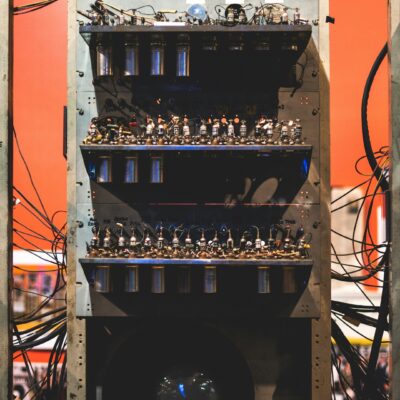Introduction to the evolution of computers
Step into the fascinating world of technology as we take a nostalgic journey through the evolution of computers. From humble beginnings to groundbreaking advancements, witness how innovation has shaped the way we live and work in today’s digital age. Join us as we explore the remarkable history that has led us to where we are now in the realm of computing.
The first computers: from abacuses to punch cards
Imagine a time when computers were not sleek devices on our desks or in our pockets, but rather bulky machines that filled entire rooms. This was the reality of the first computers, a far cry from the portable gadgets we know today.
The journey began with ancient abacuses, calculating tools used by civilizations centuries ago to perform basic arithmetic. Fast forward to the 19th century when punch cards revolutionized data processing and helped pave the way for modern computing.
These early innovations laid the foundation for what was to come – a world where technology would advance at an exponential rate, changing how we work, communicate, and live our daily lives. The evolution from abacuses to punch cards marked just the beginning of a remarkable technological revolution that continues to shape our world today.
The rise of personal computers and the birth of Windows
The rise of personal computers marked a significant shift in the way individuals interacted with technology. From bulky machines to sleek desktops, the evolution was rapid.
One key player in this era was Microsoft, introducing Windows as an operating system that revolutionized user interfaces.
The birth of Windows brought graphical user interfaces to the forefront, making computing more accessible and intuitive for everyday users.
Users could now navigate their digital world with ease through windows, icons, and menus – a far cry from the command-line interfaces of earlier systems.
Windows quickly became synonymous with personal computing, setting a standard that influenced generations of software development.
With each iteration, Windows continued to innovate and adapt to changing technological landscapes, solidifying its place in history as a cornerstone of PC operating systems.
The impact of the internet and the development of laptops
The impact of the internet on computers was revolutionary. It opened up a whole new world of connectivity and information sharing. With the rise of the World Wide Web, laptops became essential tools for accessing this vast network from anywhere. Suddenly, people could work, communicate, and be entertained on-the-go.
Laptops evolved to become sleeker, more powerful, and portable. They offered flexibility and convenience that desktop computers couldn’t match. The development of Wi-Fi technology further enhanced their utility, making it easier to stay connected without being tethered by cables.
As laptops gained popularity, they transformed how we interact with technology in our daily lives. From students taking notes in class to professionals working remotely, laptops have become indispensable companions in this digital age. Their adaptability and performance continue to shape how we live and work in today’s interconnected world.
Mobile devices and the era of smartphones
Mobile devices have revolutionized the way we communicate, work, and live our lives. From the early days of bulky cell phones to the sleek and powerful smartphones we carry today, technology has come a long way. The era of smartphones has brought endless possibilities right to our fingertips.
With features like high-resolution cameras, advanced apps, and instant access to information, smartphones have become an essential part of modern life. Whether it’s staying connected with loved ones or managing your daily tasks on the go, these devices have truly changed the game.
The convenience of having a mini-computer in your pocket is undeniable. We can now shop online, stream music and videos, navigate unfamiliar places with GPS – all from one device. Smartphones have not only made our lives easier but also more interconnected than ever before.
As technology continues to advance at lightning speed, who knows what amazing innovations lie ahead in the world of mobile devices?
Artificial intelligence and the future of computing
Artificial intelligence (AI) has revolutionized the way we interact with technology, paving the path for exciting advancements in computing. From chatbots that provide customer service to self-driving cars, AI is reshaping our world. Machine learning algorithms allow computers to learn and improve from data, enabling them to make complex decisions and predictions.
The future of computing is deeply intertwined with AI, as it continues to push boundaries and drive innovation across various industries. The development of sophisticated neural networks and deep learning techniques has opened up new possibilities for intelligent systems that can mimic human cognition.
As we look ahead, AI-powered technologies are expected to become even more integrated into our daily lives. Whether it’s enhancing healthcare through predictive analytics or optimizing business operations through automation, the potential applications of AI are vast and promising.
Exciting times lie ahead as researchers and developers continue to explore the endless capabilities of artificial intelligence within the realm of computing.
Reflecting on how far we’ve come and what’s next for technology
Reflecting on how far we’ve come and what’s next for technology, it’s incredible to see the journey that computers have taken. From simple abacuses to powerful smartphones and artificial intelligence, the evolution of technology has been remarkable. As we look towards the future, advancements in quantum computing, blockchain technology, and augmented reality are poised to revolutionize the way we interact with machines.
The possibilities seem endless as we continue to push the boundaries of what is possible with computing. Who knows what amazing innovations lie ahead? One thing is certain – technology will continue to shape our world in ways we can’t even imagine. So let’s embrace the changes and be excited for what lies ahead in this ever-evolving field of computing.





